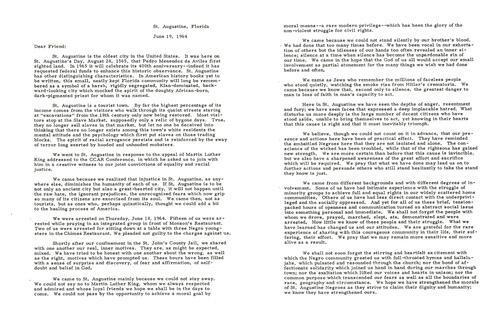Letter from the Rabbis Arrested in St. Augustine
Michael Robinson (1924-2006)
Born and raised in Asheville, NC, Michael Robinson was familiar with the inequalities between blacks and whites in the South, but he also learned that it didn't have to be this way. Robinson's father was an optometrist who treated black and white patients in the same office. When he was 10 years old, his "colored mammy" (an African American woman who worked as a servant, often helping to raise a white family's children) was forced to sit on the back of the bus and young Robinson chose to sit with her even though he was breaking the law and local custom.
Michael Robinson got involved in the Civil Rights Movement in the late 40s and early 50s, while a rabbinic student at Hebrew Union College-Jewish Institute of Religion, the Reform movement's seminary. During that time, he organized a group of fellow students to try and desegregate a Greek restaurant in Cincinnati. After ordination, Robinson took a pulpit in Croton, NY, a suburb of New York City. During the summer of 1964, Rabbi Robinson, along with a number of other Reform rabbis who had been attending the Central Conference of American Rabbis conference, answered Martin Luther King's call to join him in St. Augustine, FL. Once there, he was arrested, along with 15 other rabbis, for participating in civil rights activities.
Why We Went: A Joint Letter from the Rabbis Arrested in St. Augustine
"Why We Went: A Joint Letter from the Rabbis Arrested in St. Augustine," June 19, 1964, page 1 of 3
"Why We Went: A Joint Letter from the Rabbis Arrested in St. Augustine," June 19, 1964, page 1 of 3.
Courtesy of Dr. Eugene Borowitz.
"Why We Went: A Joint Letter from the Rabbis Arrested in St. Augustine," June 19, 1964, page 2 of 3
"Why We Went: A Joint Letter from the Rabbis Arrested in St. Augustine," June 19, 1964, page 2 of 3.
Courtesy of Dr. Eugene Borowitz.
Discussion Questions
Part I
- Initial assessment: Who wrote this document? When?
- Where was it written?
- Who do you think the intended audience was? How do you think this might have influenced the message?
- What did the rabbis who wrote this letter do to get arrested?
- In their letter, the rabbis say that "We came because we could not stand silently by our brother's blood." This quote is based on Leviticus 19:15-16 which says, "You shall not render an unfair decision: do not favor the poor or show deference to the rich; judge your kinsman fairly. Do not deal basely with your countrymen. Do not stand on the blood of your neighbor." It is part of the Torah portion known as kiddushim, or the holiness code, which is read during the High Holy Days.
What do you think the biblical quote means? What do you think the rabbis in St. Augustine meant by this quote? Why do you think they chose to use a biblical reference? - What do you think are some of the reasons these rabbis chose to participate in civil rights activities in St. Augustine? What in the letter makes you say that? Which of their reasons were based in Judaism? Which were universal? Which were particular to being a rabbi/Jewish leader?
- What part do you think community played in their experience before their arrest and during their time in prison?
- What did the rabbis feel they had accomplished by their actions in St. Augustine?
- What impact did the rabbis' actions have on them personally? In thinking about the reasons for and impact of activism, how would you rate the ways in which it changes the activist?
Part II
- How do you think these rabbis' experience and/or Jewish values influenced their participation in the Civil Rights Movement? What clues from the letter make you think that?
- How would you describe the role that these rabbis played in the Civil Rights Movement?
- Do you think this is an appropriate role for a rabbi? Why or why not?
- Are there any current political/social issues on which you think rabbis today should take a stand? What kind of role would you want to see them take?





